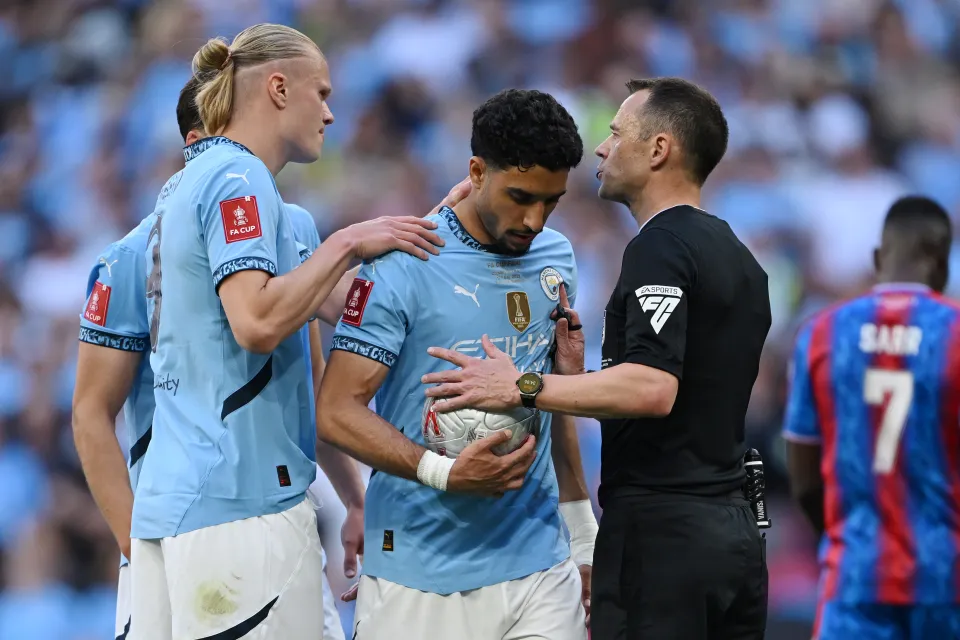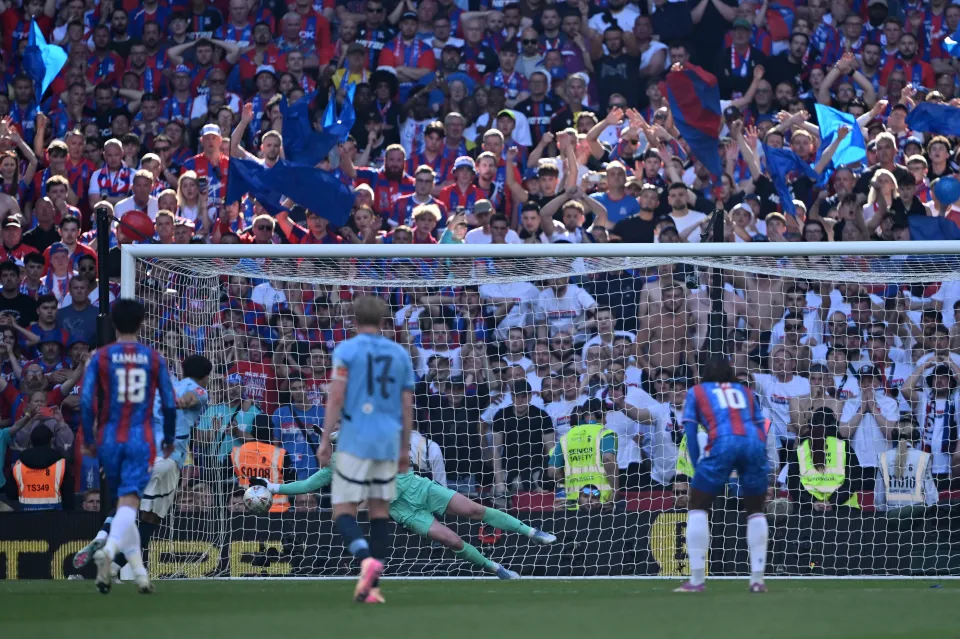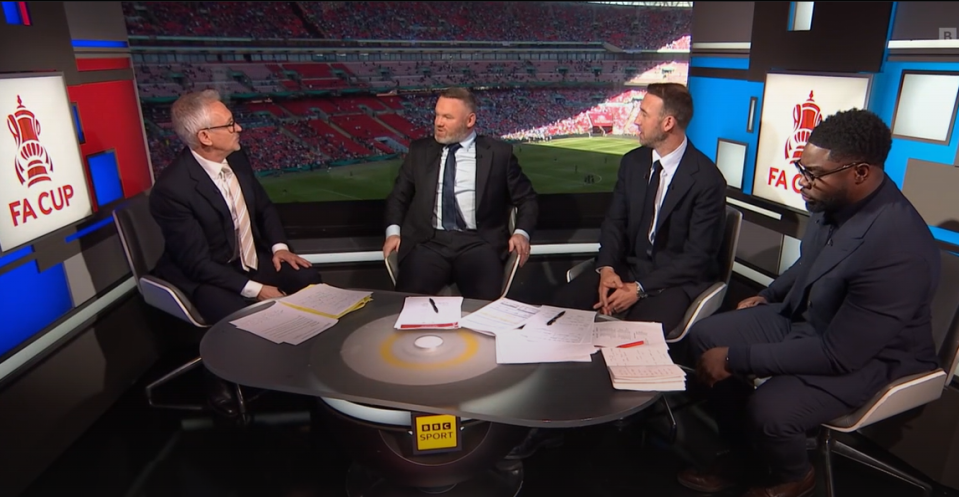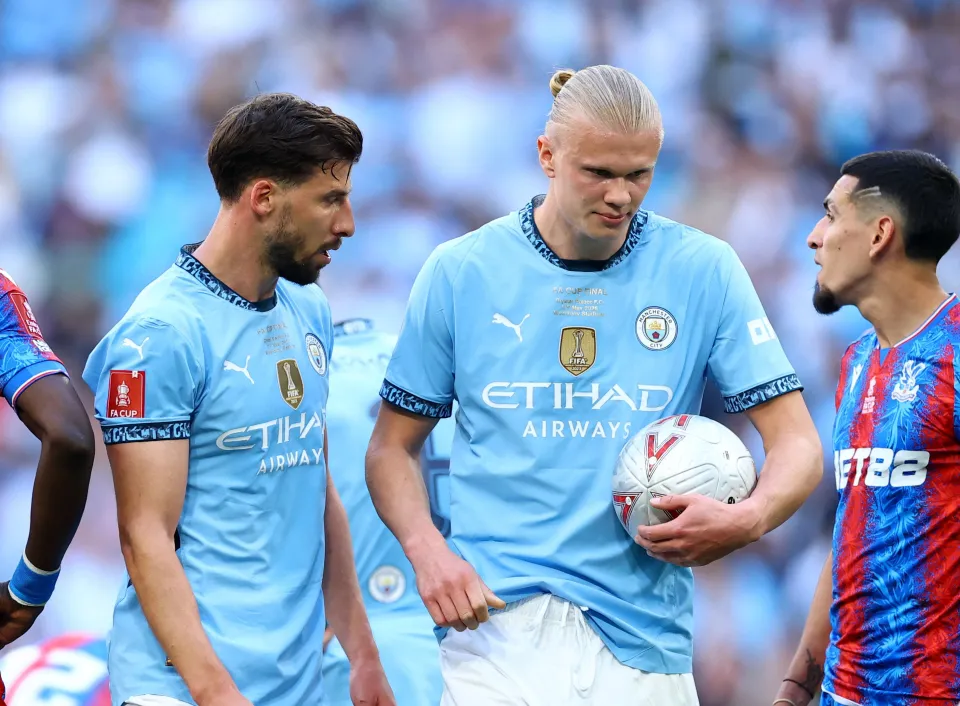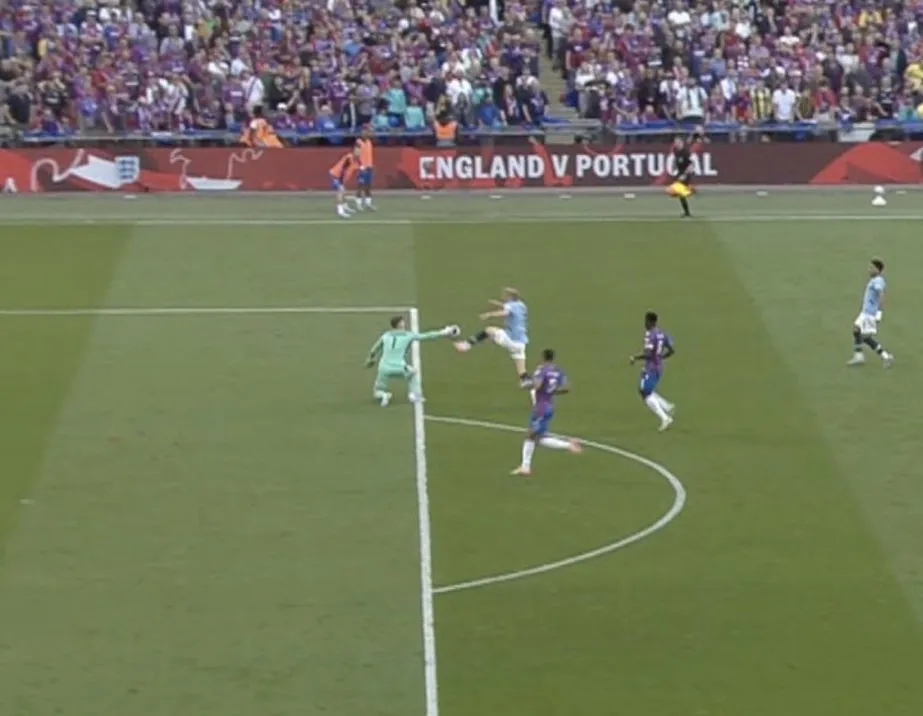Certainly! Here is a detailed, expert-style article of approximately 3000 words on Wayne Rooney’s theory about Erling Haaland giving up the FA Cup final penalty, including the surrounding context, analysis, and key moments from the game.
Wayne Rooney’s Theory on Erling Haaland’s FA Cup Final Penalty Decision Shocks BBC Studio
The 2024 FA Cup final between Manchester City and Crystal Palace delivered drama both on and off the pitch, culminating in a historic 1-0 victory for Palace. One of the most intriguing moments came when Erling Haaland, Manchester City’s prolific striker, chose—or was seemingly instructed—not to take a first-half penalty at Wembley. This surprising event sparked widespread discussion and analysis, with former England captain Wayne Rooney offering a compelling theory that left the BBC studio stunned.
Haaland’s Penalty Decision at Wembley: An Unexpected Move
Erling Haaland’s decision to hand over the penalty to team-mate Omar Marmoush in the 36th minute was a pivotal moment in the match. For a striker known for his ruthless finishing and clinical nature in front of goal, especially since joining Manchester City in 2022 from Borussia Dortmund, the choice raised eyebrows.
Wembley: A Ground Haaland Has Yet to Conquer
Despite Haaland’s extraordinary goal-scoring form throughout his career, Wembley Stadium remained a fortress he had yet to fully conquer. Entering the FA Cup final, Haaland had made four appearances at Wembley but was still seeking his first goal at the national stadium.
This made the penalty spot—often a stage for drama and redemption—all the more significant. Yet, instead of stepping up, Haaland passed the responsibility to Omar Marmoush, a 24-year-old forward who had recently made his mark but was arguably less established in the Manchester City squad.
Marmoush’s Penalty Record vs Haaland’s Struggles from the Spot
Marmoush had demonstrated impeccable penalty-taking form during the season, boasting a perfect record of 4/4 from the spot, all achieved while on loan at Eintracht Frankfurt earlier in the campaign. In contrast, Haaland’s penalty record was less flawless, having missed three out of seven attempts that season—a surprising statistic for a player of his calibre.
When Tyrick Mitchell’s challenge brought down Bernardo Silva inside the box, the ensuing spot kick was expected to be Haaland’s moment to break his Wembley duck and add to his goal tally. However, the decision to let Marmoush take the penalty added an unexpected twist to the final.
The Penalty Incident: What Happened on the Pitch?
Marmoush’s penalty was saved comfortably by Crystal Palace goalkeeper Dean Henderson, who had an eventful night. Following the save, Haaland’s rebound attempt failed to find the net, leaving Manchester City without a goal from their golden opportunity.
The miss was a significant moment that possibly swung momentum in Palace’s favour and added to the tension of an already fiercely contested final.
Wayne Rooney’s Theory: Penalty Duties Taken Off Haaland Before Kickoff
BBC pundit Micah Richards voiced his surprise at Haaland’s decision to relinquish the penalty. In response, Wayne Rooney offered an insightful theory that challenged the surface assumptions.
Rooney suggested that Haaland didn’t willingly give up the penalty but rather that the decision had been made before the game by the team management or coaching staff.
He explained:
“I don’t think he’s given it away. I think it’s been taken off him before the game, I think it’s been decided (pre-match).”
Rooney’s interpretation hints at a broader tactical or psychological strategy, possibly motivated by Haaland’s recent struggles with penalties or his record at Wembley.
When fellow pundit Gary Lineker remarked, “You can’t override the manager,” Rooney argued that players sometimes do have the agency to defy or override decisions on the pitch, adding:
“There’s moments you can. And I think Haaland should have taken the penalty.”
Pep Guardiola’s Comments: Decision Made on the Pitch
Following the game, Manchester City manager Pep Guardiola provided some clarity on the situation, though it only deepened the mystery.
Guardiola admitted that he had not explicitly instructed Haaland to relinquish the penalty:
“They decided on the pitch. I don’t know. I didn’t speak with them. I thought he [Haaland] would want to take it. These are things for them. That moment for the free kick, for the penalty, it’s the feeling and how they feel. They decided Omar was ready to take it.”
This suggests the decision was a spontaneous choice between the players rather than a fixed managerial directive, highlighting the fluid and psychological nature of in-game decisions.
Guardiola praised Dean Henderson’s penalty save but acknowledged it was a “good save” rather than a mistake on the taker’s part.
Dean Henderson’s Impact: The Lucky Escape and Penalty Save
Dean Henderson, the Crystal Palace goalkeeper and former Manchester United star, played a crucial role in the final beyond his penalty save.
Controversial Handball and Referee’s Decision
Earlier in the game, Henderson was fortunate not to receive a red card after deliberately handling the ball outside his penalty area—an offence that would normally warrant an immediate dismissal.
At half-time, Gary Lineker revealed that Video Assistant Referee (VAR) officials had reviewed the incident and concluded that although Henderson’s handball stopped a potential goal-scoring opportunity, the angle and direction Haaland was heading made it not an obvious goal-scoring chance.
This decision left many, including Wayne Rooney, frustrated.
Rooney Calls for VAR Abolition
In response to the VAR ruling and the ongoing controversies surrounding the technology, Rooney demanded that football’s governing bodies scrap VAR altogether, questioning its effectiveness and consistency.
The Significance of the Penalty Incident in the Context of the Match
Crystal Palace, inspired by their goalkeeper’s heroics and a stunning early goal from Eberechi Eze in the 16th minute, defended resolutely to maintain their 1-0 lead.
Marmoush’s missed penalty was arguably the turning point that prevented Manchester City from gaining a foothold in the match and allowed Palace to cement their historic victory—winning the FA Cup for the first time ever.
Haaland’s Wembley Woes: A Broader Context
Haaland’s struggles at Wembley are part of a wider narrative about the striker’s adjustment to English football’s biggest stages.
Grounds Without Goals: Brentford and Anfield Also a Challenge
Wembley is one of only three English stadiums where Haaland has yet to score. The others are Brentford’s Gtech Community Stadium and Liverpool’s Anfield—both venues known for their intimidating atmospheres.
Psychological Factors and Performance Pressure
Given Haaland’s immense reputation and goal-scoring expectations, the pressure to perform on big occasions is intense. This might explain the decision to remove him from penalty duties during such a crucial final, aiming to ease mental strain.
Tactical and Psychological Considerations: Why Hand Over the Penalty?
Several reasons could explain Haaland’s relinquishment of penalty duties:
Recent Penalty Misses
With three missed penalties out of seven attempts this season, there might have been concerns about Haaland’s confidence from the spot.
Confidence in Marmoush’s Penalty Record
Marmoush’s flawless penalty conversion record during the season may have made him the preferred candidate.
Team Dynamics and Player Morale
Handing over a penalty can sometimes be a gesture to boost a team-mate’s confidence or build cohesion within the squad.
The Debate: Should Haaland Have Taken the Penalty?
This question divides opinion among pundits and fans alike.
Arguments For Haaland Taking the Penalty
- His status as the team’s primary goal threat and striker.
- The psychological boost scoring a first Wembley goal could provide.
- Accountability and leadership on a big stage.
Arguments For Marmoush Taking the Penalty
- Marmoush’s perfect penalty record.
- Haaland’s recent misses creating doubt.
- Tactical decision to ease Haaland’s pressure.
Legacy and Lessons from the FA Cup Final
The incident shines a light on the complexities of modern football—how pressure, psychology, and split-second decisions can shape outcomes.
For Haaland, it represents a hurdle in what is otherwise a stellar career. For Manchester City, it serves as a lesson in managing star players and handling pressure moments.
For Crystal Palace and Dean Henderson, it’s a night to remember—one defined by grit, resilience, and a touch of fortune.
Conclusion: A Moment That Sparked Debate and Reflections
Wayne Rooney’s theory about Haaland’s penalty situation—suggesting the responsibility was taken from him pre-match—adds depth to the narrative of the 2024 FA Cup final.
It reminds us that what happens on the pitch is often just the visible tip of a much larger iceberg of decisions, emotions, and strategies.
As fans digest the result and the drama, the Wembley penalty incident will continue to be discussed, analysed, and debated—an enduring chapter in the story of Erling Haaland’s journey and Manchester City’s pursuit of glory.
- Lip Filler London – Natural Lip Enhancement & Lip Augmentation - December 16, 2025
- Explore THC Soda in Wyoming - June 4, 2025
- Nevada’s Hottest THC Seltzer Trends - June 4, 2025
